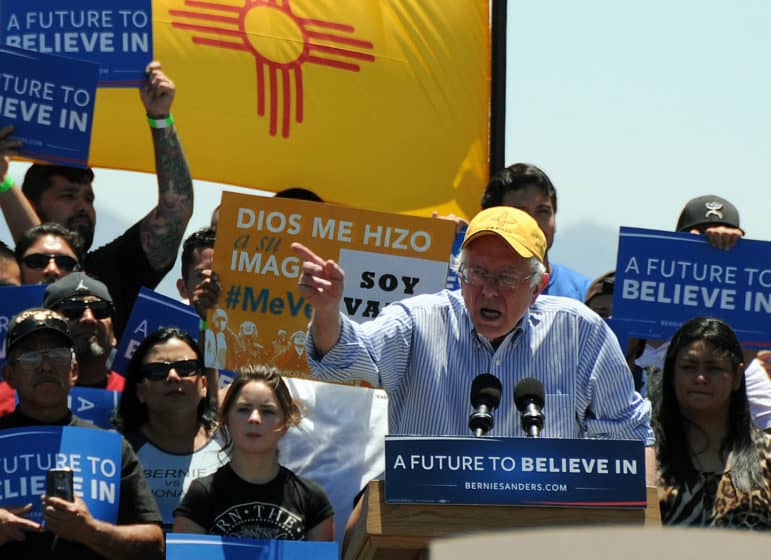
Heath Haussamen / NMPolitics.net
Democratic presidential candidate Bernie Sanders speaking at a campaign rally in Vado in May.
As a Democratic presidential hopeful, Sen. Bernie Sanders of Vermont vociferously argued for political transparency, especially when money was concerned.
Sanders insisted, for example, “on complete transparency regarding the funding of campaigns.” He decried “huge piles of undisclosed cash” benefiting candidates.
But when federal law required Sanders to reveal, by mid-May, current details of his personal finances, his campaign lawyer asked the Federal Election Commission for a 45-day extension.
Request granted.
On June 30, Sanders’ campaign requested a second 45-day extension, saying the senator had “good cause” to delay because of his “current campaign schedule and officeholder duties.”
Again, regulators approved Sanders’ punt.
Now that Sanders’ second extension has expired, spokesman Michael Briggs confirmed to the Center for Public Integrity that the senator won’t file a presidential campaign personal financial disclosure after all.
“We were told that since the senator no longer is a candidate there was no requirement to file,” Briggs said.
FEC spokesman Christian Hilland verified that Sanders has not filed a personal financial disclosure. He likewise confirmed that Sanders, who technically ceased to be a presidential candidate when Hillary Clinton secured the Democratic nomination on July 26, is no longer required to file one.
A 2011 legal advisory from the United States Office of Government Ethics provides Sanders cover, stating that “the requirement to file a Public Financial Disclosure Report … ends when the candidate is no longer seeking nomination or election to the office of president.”
On the one hand, who now — beside political voyeurs and snoopy journalists, perhaps — would care about the investments and income of an also-ran presidential candidate who hasn’t been a major factor in Election 2016 for more than two months?
But on the other, Sanders expertly exploited a system that effectively allowed him to delay, delay, delay — all while he chided Clinton’s receipt of six-figure paydays for delivering closed-door speeches to officials at investment bank Goldman Sachs and other powerful special interests. (Both Clinton and Republican presidential nominee Donald Trump filed their personal financial disclosures on time in mid-May without asking for extensions.)
Therefore, in the teeth of a Democratic primary where Sanders posed a bona fide threat to Clinton, voters couldn’t definitively know whether Sanders — historically one of the Senate’s least wealthy members — suddenly parlayed his political fame into personal profit. Or, for that matter, whether he sustained financial distress.
The form Sanders didn’t file would have detailed his finances through the middle of May 2016.
His most recent U.S. Senate disclosure, which details only his 2015 assets, show his wealth concentrated in a collection of mutual funds owned by his wife, Jane Sanders.
Beyond his Senate salary, Sanders himself draws a small pension from the government of Burlington, Vermont, where he once served as mayor. And he’s also received a handful of modest honoraria for speeches and television show appearances, although he reported donating them to charity.
Sanders also carried up to $50,000 in credit card debt and up to $1 million in mortgage debt, according to his 2015 U.S. Senate personal financial disclosure.
Sanders filed that Senate disclosure document on June 6. This somewhat undercuts his presidential campaign’s argument, made around the same time, that Sanders was too busy campaigning to complete and submit a presidential disclosure covering his finances during early 2016.
“It’s disappointing that a candidate who spent so much time talking about political reform … and was critical of Hillary Clinton’s personal finances, chose not to let us know anything about his own,” said policy analyst Richard Skinner of the nonpartisan Sunlight Foundation, which advocates for political transparency.
Had Sanders filed a personal financial disclosure report this month, it would have looked more or less like the ones Sanders had filed in the past, Briggs said.
“There’s a couple decades’ worth of congressional financial disclosure reports that show pretty much the same thing from year to year,” Briggs said.
The public will eventually find out how Sanders managed his assets while running for president: As a sitting senator, Sanders must next year file a personal financial disclosure with the U.S. Senate covering calendar year 2016.